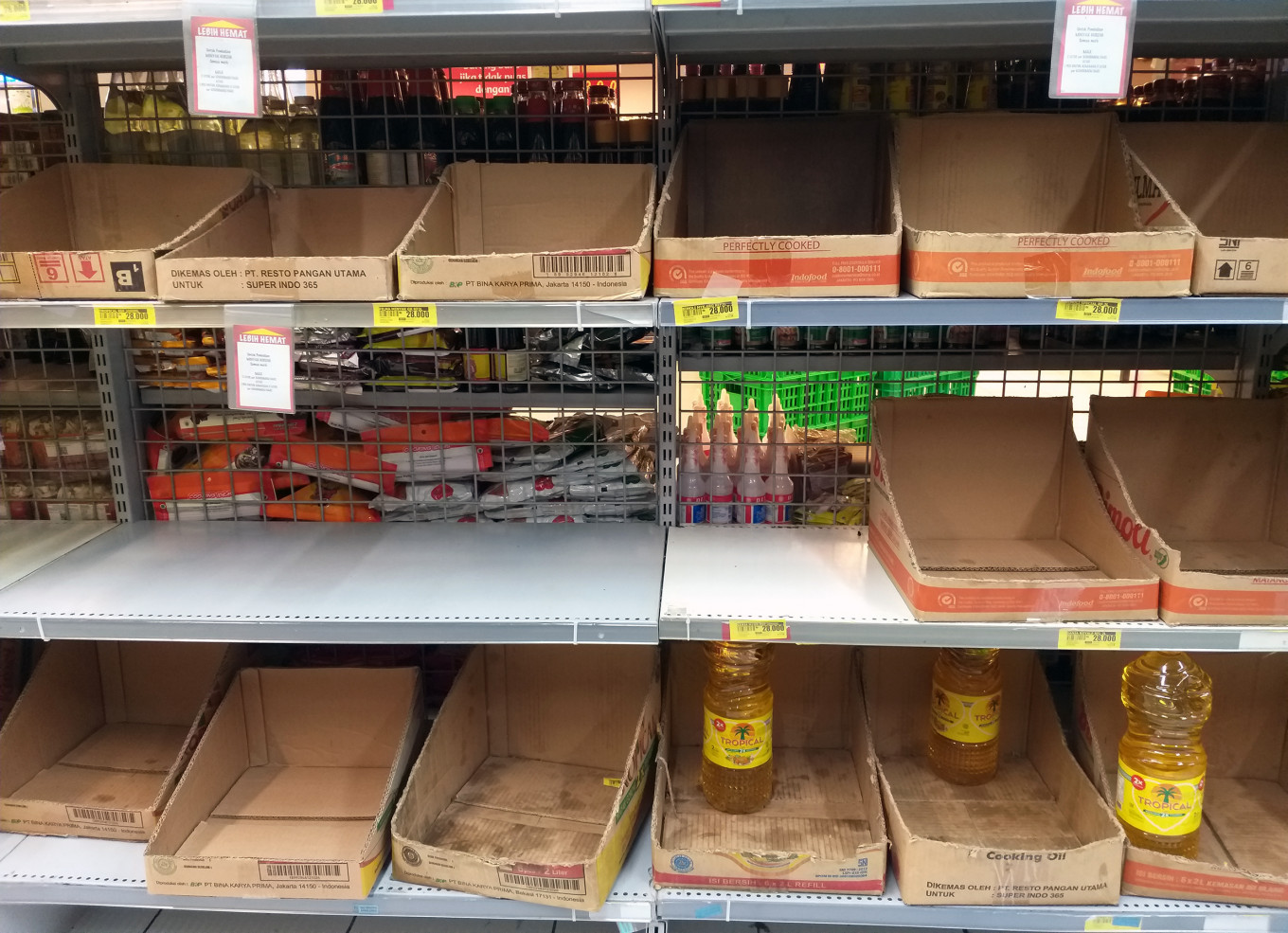Popular Reads
Top Results
Can't find what you're looking for?
View all search resultsPopular Reads
Top Results
Can't find what you're looking for?
View all search resultsCooking oil debacle is palm oil conundrum
The government needs to come up with an appropriate policy measure based on big data to tackle the skyrocketing prices of domestic cooking oil.
Change text size
Gift Premium Articles
to Anyone

T
he government’s hasty decision to impose on palm oil producers domestic market obligation (DMO) that amounts to 20 percent of their export volumes for crude palm oil (CPO) and olein seems to have been prompted more by frustration over its inability to understand why cooking oil prices have risen more than 40 percent over the past year.
When the government launched the DMO policy for palm oil producers on Jan. 28, it did not elaborate on the technical details on how the policy would be implemented or which institution would manage and supervise the DMO.
We even doubt that the government is apprised of the whole structure of the palm oil industry, as evidenced by the spate of four different decrees Trade Minister Muhammad Lutfi issued between Jan. 11 and 28 to cope with the debacle over cooking oil prices.
After his three earlier decrees failed miserably to stabilize cooking oil prices and instead caused chaos in the market, the minister ruled on Jan. 28 that starting the very next day, palm oil companies must sell 20 percent of their respective CPO and olein export volumes to local cooking oil producers at the domestic price obligation, set at a maximum Rp 9,300 (64 US cents) per kilogram for CPO and Rp 10,300 per kg for olein.
International CPO prices have hovered above $1,000 per ton over the past few months.
The government seems to be confused by the steady and steep rise in cooking oil prices, arguing that domestic prices should not have followed the international CPO prices because Indonesia is the world's largest palm oil producer. Local production costs are not heavily influenced by global CPO prices.
According to industry association Gapki [Indonesian Palm Oil Association], only 10 percent of Indonesia's CPO production of around 46 million tons is processed into cooking oil, as the estimated domestic consumption of cooking oils among households and industries is only 5.7 million tons. The estimated cooking oil export for 2021 was 16 million tons.
The confusion eventually led the government to reveal the suspicions of the Business Competition Supervisory Commission (KPPU) that the steep price hike had been caused by cartel behavior or oligopolistic practices in the market.
There seems to be a sense of déjà vu.
The KPPU conducted an investigative audit of the cooking oil industry in 2008-2009 and in 2010, decided to fine 20 cooking oil producers that were found guilty of cartel behavior Rp 291 billion ($21 million).
True, the price of international CPO, which supplies 95 percent of Indonesian cooking oil, has risen almost 45 percent to as high as $1,300 per ton over the past year. But domestic cooking oil prices should not have increased by over 40 percent as well.
Moreover, according to the KPPU, six groups comprising fully integrated palm oil businesses control almost 61 percent of the cooking oil market, with the remaining 39 percent shared among 26 other producers, many of which do not have oil palm estates or produce olein.
These integrated producers should not have raised price of their cooking oils even though international CPO prices have risen sharply, because they also produce CPO and olein, the raw materials for cooking oil.
Put another way, the steep increase in international CPO prices should not have a significant impact on the production costs of domestic cooking oil because CPO and cooking oil production do not use imported inputs much, except for those cooking oil producers that must procure olein from the free market.
Consumer organizations and many politicians supported the draconian policy measure as shock therapy for the industry. But in the absence of clear guidelines on the management and oversight of enforcing the DMO, the policy could cause chaos in the domestic market.
Yet more worrisome is that the government apparently did not have comprehensive, up-to-date, accurate data on the production of CPO and CPO-based derivatives such as olein, stearin, oleochemicals and cooking oil, and was not well apprised of the industry structure either.
However, some parties view the DMO as the wrong recipe for addressing the predicament over cooking oil prices, because the radical policy seems to be based on a very shallow and shortsighted diagnosis of the issues involved.
The domestic palm oil industry has been subjected to a windfall tax, or export surcharge, whenever global prices exceeded a predetermined level since 2015. This tax was recently set at $750. The tax is collected by the Oil Palm Plantation Fund Management Agency (BPDPKS), which uses the fund to subsidize biofuels and finance replanting of smallholder oil palm estates.
The DMO policy could be another blow to the palm oil industry after the recent Environment and Forestry Ministry decree, which revoked several hundred thousand hectares of land concessions of palm oil companies because of their alleged failure to meet regulatory requirements.
The decree was controversial because many of the land concessions had been planted with oil palm under the right to cultivate the companies had obtained from the Agrarian and Spatial Planning Ministry.
Now, the industry has been hit with the DMO rule. Both policies were formulated hastily with only a basic, shallow review of the issues and without consultation and meaningful engagement with the affected palm oil companies.
The latest developments in the cooking oil predicament should be the right moment for the government to look more deeply into the palm oil industry by gathering more accurate, up-to-date and comprehensive data on our oil palm plantations and the production of CPO and its derivatives.
Only with accurate data can the government develop an integrated policy that outlines a comprehensive, clear framework and road map for the industry.
***
The writer is an analyst of sustainable palm oil.









